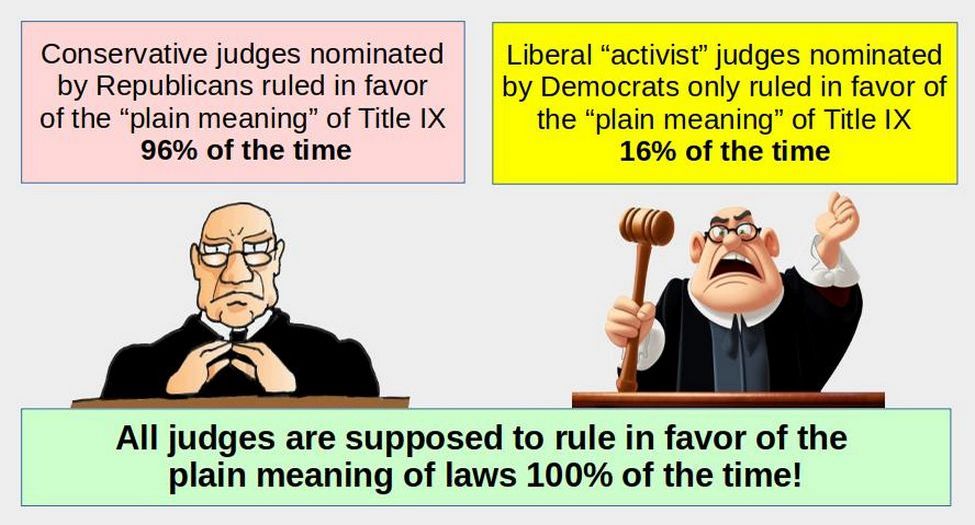There is no question that the election system in Washington state is one of the worst in the nation. The most secure voting method is local, in-person voting with paper ballots and multiple checks. Instead, Washington uses automatic voter registration with almost no checks for non-citizens and all mail-in voting with almost no checks for who is actually filling out the ballot. Equally bad, Washington uses insecure voting machines that are easily hacked to remotely change vote results and insecure “Omniballot” online vote curing processes that violate both state and federal election laws prohibiting online voting. I have for many years written reports criticizing nearly every aspect of the election process here in Washington state.
At the same time, promoting data mining schemes that do next to nothing to address these very real problems - and instead violate federal election laws and court rulings - can do more harm than good. This is one of several problems with the “Proof of Citizenship from Registered Washington Voters” Initiative. This Voter ID Initiative was discussed at a recent Washington State Republican Party Election Integrity meeting during which several people expressed serious concerns about the legality of this Initiative. Among those expressing concerns at this meeting was a County Auditor who stated that this Initiative may violate federal laws and/or federal court rulings. After this Election Integrity committee meeting, I spent several weeks doing research on federal laws and federal court rulings related to the proposed Washington Voter ID Initiative.
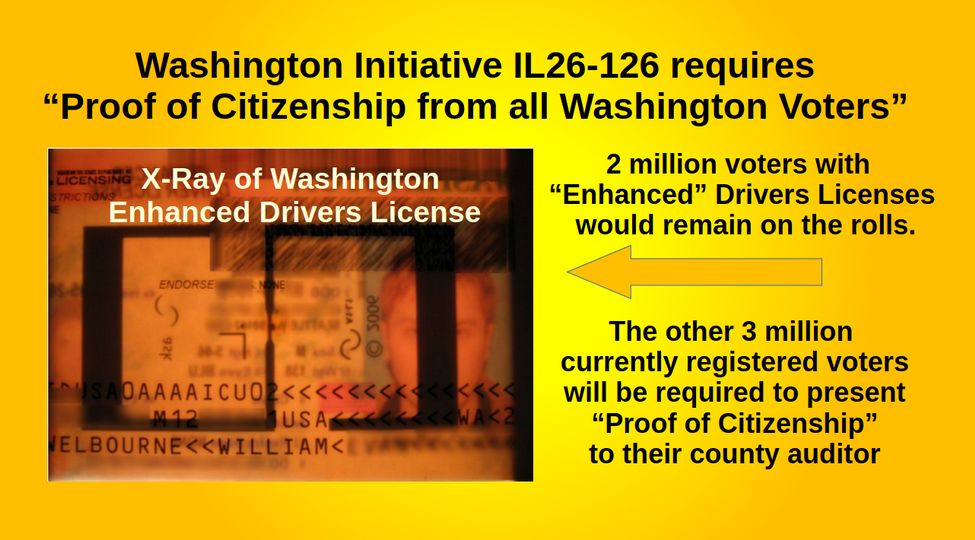
My concern was (and still is) that this Initiative violates federal laws and court rulings. In addition, the Washington State Republican party might waste millions of dollars and countless hours of volunteer time gathering hundreds of thousands of signatures to place the Initiative before the legislature - only to see the Initiative challenged and tossed out in federal court due to legal violations.
In this article, we will review 20 major problems with the Voter ID Initiative and then provide 11 alternatives that could save the Washington State Republican party not only a million dollars and countless hours invested by volunteers – but equally important – actually improve the accuracy of voter rolls and thereby improve our election system here in Washington state.
Problem #1 Claims that the “Voter ID Initiative was reviewed by a Thurston County judge and found to be valid” are false
Proponents of the Voter ID Initiative have claimed that the Initiative was reviewed by a Thurston County judge and found to be valid. In fact, the judge only reviewed the ballot title and summary. The judge did not review or make any ruling at all on the legality of the actual text of the Initiative. The judge clarified the title by adding a few words on July 10, 2025.
Here is the court ordered ballot title Statement of Subject :
Initiative Measure No. IL26-126 concerns heightened voter registration requirements for applicants and currently registered voters.
Here is the court ordered ballot title Concise Description:
This measure would require voters to have an enhanced driver's license or enhanced Identicard, or provide documentary proof of U.S. citizenship in person, and would cancel registrations for voters not meeting those requirements. Should this measure be enacted into law? Yes [ ] No [ ]
Here is the court ordered Ballot Measure Summary
This measure would require voter registration applicants to have an enhanced driver"s license or enhanced identicard, or, alternatively, to demonstrate proof of US citizenship in person at their county auditor's office by providing certain types of documentary evidence, as specified by the measure. The measure imposes the same requirements on existing voters and would require cancellation of registrations for voters who have not met those requirements 14 days prior to the 2027 general election.
Problem #2 The Initiative gives preference to those who already have a Washington State “Enhanced” Drivers license
Here is a link to the 9 page PDF of this Initiative
https://www2.sos.wa.gov/_assets/elections/initiatives/finaltext_3262.pdf
Here are the six acceptable forms of ID required for for a Proof of Citizenship required in order to register to vote:
(I) a valid current Washington State Enhanced Drivers License; (or)
(ii) a valid current Washington State Enhanced Identicard; (or)
(iii) A valid current United States passport; (or)
(iv) An original United States certificate of naturalization; (or)
(v) A US Department of State consular report of birth abroad; or
(vi) An original, certified birth certificate from a US birth place, issued by a city, county, state, or territory, that contains all of the following:
(A) Full name and date of birth;
(B) Place of birth, which must be a United States location;
(C) A registrar's raised, embossed, impressed, or multicolored seal;
(D) A control or file number that the issuing authority can confirm;
(E) A registrar's signature; and
(F) The date the certificate was filed with the registrar's office.
Those with an Washington state Enhanced Drivers License or Enhanced ID Card will automatically remain in the voter rolls. Anyone without an enhanced Washington Drivers license or ID Card will be removed from the voter rolls and will be required to bring either a valid US passport or original certified birth certificate to their county auditor to get back on the voters roll.
What is an enhanced Washington Drivers License?
An “Enhanced” Drivers License requires providing additional evidence such as an original certified birth certificate. It costs $128 to get an Enhanced Drivers License for 8 years. It is mainly used by folks who fly on planes or go across the Canadian or Mexican border. It was claimed that, starting May 7, 2025, normal Washington Drivers licenses would no longer be accepted as valid forms of ID for boarding domestic flights. However, so few people have enhanced Drivers Licenses (also called Real ID), that folks can still go on domestic flights without them – but they are put in a separate line where they are asked questions like what is their address.
The percent of drivers in Washington state with enhanced drivers licenses is very low
Despite the repeated threats being made about Real ID being required over the past 17 years, many people have refused to comply. There are 5 million registered voters in Washington state. A May 6, 2025 article indicated that only 29% of Washington drivers have an enhanced drivers license. https://www.seattletimes.com/seattle-news/as-real-id-deadline-becomes-reality-wa-wait-times-stretch-really-long/
Here is the graph:
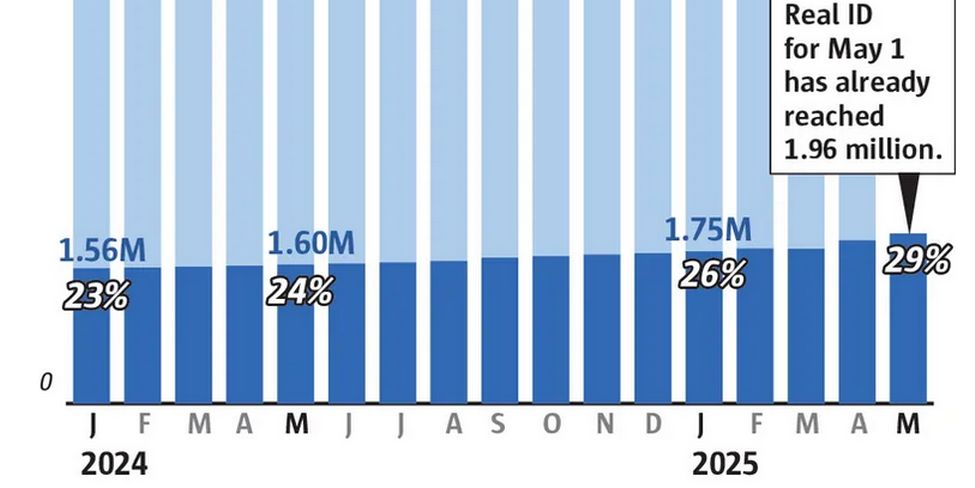
The total number of normal Washington IDs bearing a mark that says “Federal limits apply” — restricting domestic air travel without another form of Real ID — has hovered around 5 million for the past two years. Thus, it is reasonable to assume that of our 5 million voters, only about 2 million have an enhanced drivers license and will therefore not need to register in person. However, 3 million currently registered and valid Washington voters do not have an enhanced drivers license and will be required to appear in person with a valid birth certificate or a valid passport at their county auditors office to remain on the voters rolls.
Why have so many people refused to get an enhanced license?
Some people object to getting an enhanced drivers license because it costs $128 for 8 years. Some object that they are unable to get an enhanced license because they have no idea where their original Birth Certificate is. A normal Washington Drivers License now states “Federal Limits Apply.”
(See image below)
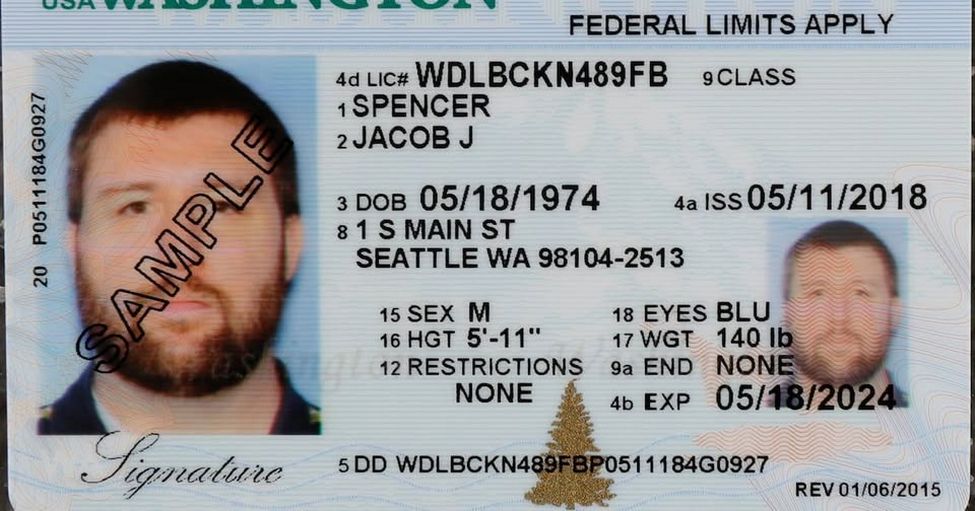
Some people have refused to get an enhanced Washington license because it contains a Radio Frequency Identification (RFID) microchip, radio transmitter and antenna inside the enhanced license which connects to a biometric database.
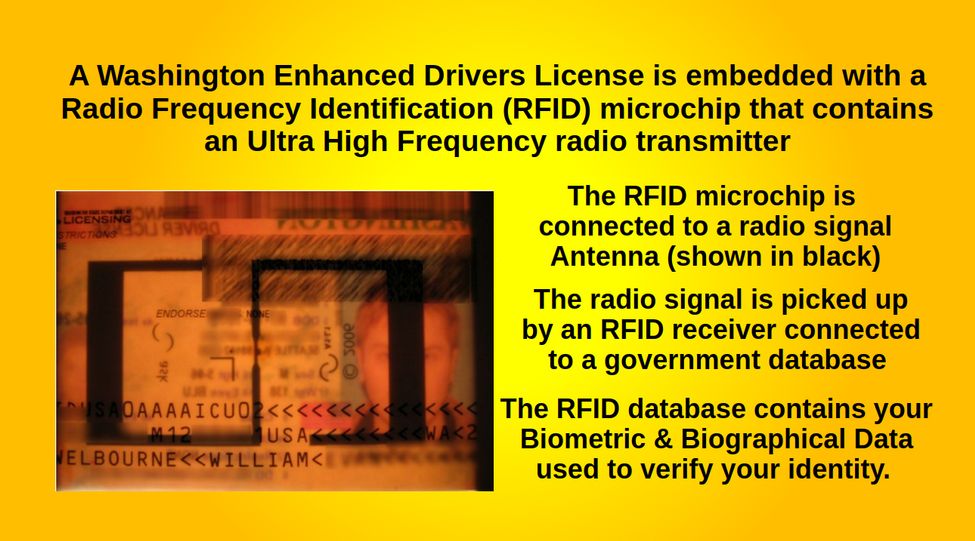
Whatever the reason, 71% of Washington voters do not currently have an Enhanced Drivers License. Thus, 3 million people that will not be “opted in” with an Enhanced License. They will be removed from the voter rolls and will need to find their original birth certificate or a valid passport and then visit their county auditor to be put back on the voter rolls.
Even after 20 years of threatening Americans that they will not be able to get on a plane if they do not get an Enhanced Drivers License, 70% of Washington Drivers have refused to get the Enhanced Drivers License. These Washington citizens have “voted with their feet” that they are opposed to the Enhanced Drivers Licenses.
For many citizens, the problem is not the additional $180 for 8 years. Rather, it is the fact that the Enhanced License comes with a Radio Frequency Identification (RFID) chip that will remotely signal police to pull up your biographic and biometric data. Radio Frequency Identification is a wireless technology that stores and retrieves data remotely. An RFID system includes four components:
#1: An RFID tag with a microchip (an Ultra High Frequency radio transmitter).
#2: An antenna embedded into the Enhanced Drivers License
#3: An RFID signal reader (a radio receiver)
#4 A government controlled database
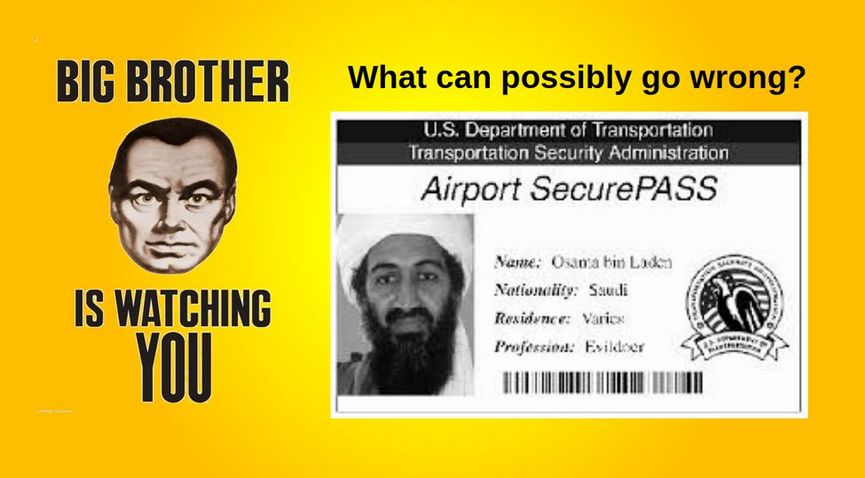
How the Radio Frequency Transmitter works
The RFID microchip embedded in your Enhanced Drivers license is programmed with a unique reference number that is connected by a database to your biographical and biometric data. At the border crossing, the police use an RFID radio receiver to obtain your unique the number.
The border agent then transmit this number to the Border Protection network. The network compares the reference number to government records and sends your biometric and biographical information back to the Border Patrol agent who then uses that information to ask you a series of questions to confirm that your information matches with the information in the government database.
Why Government controlled Biometric data will not provide security
In 2007, Chris Paget of San Francisco, California, showed that RFID information could be pulled from a US passport card by using only $250 worth of equipment. This suggests that with the information captured, it would be possible to clone such cards. So why are they still being pushed?
Follow the Money
In 2020, the world RFID market was worth US $12 billion, up from US $7 billion in 2012. This figure includes tags, readers, and software/services for RFID cards, labels, fobs, and all other form factors. The market value is expected to rise to US $16 billion by 2029.
Problem #3 There are no polls showing support for requiring every legal voter to get an “Enhanced” Drivers License or Real ID Card
Proponents of the Voter ID Initiative have claimed that there are polls confirming that voters would support their Voter ID Initiative. A 2024 Gallup poll found that 83% of Americans favored first time voters to require proof of citizenship when registering to vote. This included 96% of Republicans, 84% of Independents and 66% of Democrats.
But look more closely at the above question. The support is for first time voters to provide proof of citizenship – not for requiring ALL current voters to take extra steps to provide proof of their own citizenship. In addition, the Gallup poll did not define the term “proof of citizenship.”
Historically, Washington law has always required proof of citizenship for first time voters. For example, minors applying for a Washington Drivers License were able to provide proof of citizenship by being accompanied by a parent with an existing Washington Drivers License which confirmed that the minor was a legal citizen because their parent was a legal citizen. It is only recently that Washington laws were expanded to allow non-citizens to get Drivers Licenses and be automatically registered to vote. The problem is with the new laws – not with the existing voters.
The same 2024 Gallup poll also found that 84% of Americans favored requiring voters to provide photo ID in order to vote. This obviously requires in-person voting and is not possible with mail-in ballots. But even this Gallup poll question did not define “photo ID.” It is likely that most people were thinking of requiring a “normal” drivers license in order to vote. The Washington Voter ID Initiative would require an “Enhanced” Drivers License, also known as Real ID, or an original Birth Certificate, in order to register to vote.
But in addition, it applies to ALL VOTERS, not just first time voters. A more accurate poll question would be to ask Washington’s 5 million current voters if they want to force 3 million of them to find their Birth Certificates and bring them to their county auditor to remain on the voting rolls – because that is what the Washington Voter ID initiative really does.
Problem #4 The Voter ID Initiative also gives preference to those who already have a valid US Passport
A valid US Passport is required to travel overseas and is useful for traveling to Canada or Mexico. About 45% of Washington voters have a valid passport. But this is likely the same people who have an enhanced Drivers License. Therefore, at most 1 million people will be able to easily take their passport to their county auditor and get back on the voter rolls. But this still leaves 2 million people who will need to find their original birth certificate to get back on the voter rolls.
Problem #5 Older Americans are less likely to have a valid passport than younger Americans
A 2023 YouGov survey found that 50% of people under 30 have a valid passport but only 33% of people between ages 45 to 64 have a valid passport. Thus the age group least likely to vote (young people) have more passports while the age group most likely to vote (older people) have fewer passports. This is age discrimination.
Problem #6 About 80% of low income people do not have a valid passport
Most of those without valid passports are relatively poor people. Only 21% of people making less than 50K per year have a valid passport, while 44% of people making 50 to 100K per year have a valid passport and an amazing 64% of people making more than 100K per year have a valid passport. This is discrimination against poor people.
Problem #6 There are huge racial differences in passport ownership
55% of Hispanic Americans have passports and 42% of white Americans have passports, but only 34% of Black Americans have passports.
The fact that the Voter ID Initiative gives those with a enhanced drivers licenses and or valid passports an easier pathway to registering to vote may lead to Constitutional challenges under the 14th Amendment for racial discrimination. (see legal rulings below).
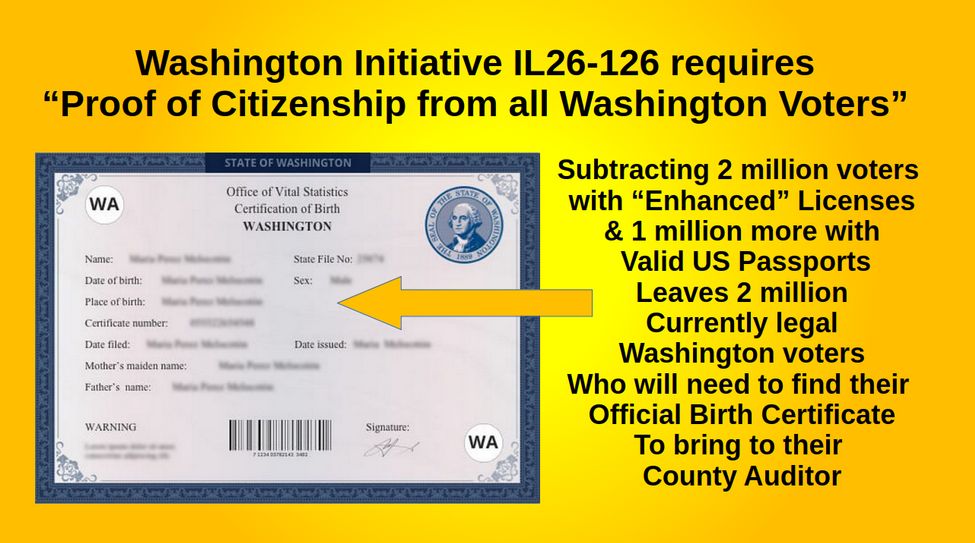
Let’s take a closer look at who these two million people without passports or enhanced drivers licenses are. It turns out they are older people, lower income people, black people and women.
Problem #7 Many people and particularly women and homeless people have problems finding or even getting a valid Birth Certificate
A survey conducted by the Brennan Center for Justice found that more than 9 percent of American citizens of voting age don’t have proof of citizenship readily available. The survey asked respondents whether they had documents that prove their citizenship — a passport, birth certificate, or naturalization papers — readily available. About 8% don’t have these documents at all, often because they were lost, destroyed, or stolen. 8 percent of five million Washington voters is 400,000 voters. Who are these 400,000 voters who are most likely to be disenfranchised?
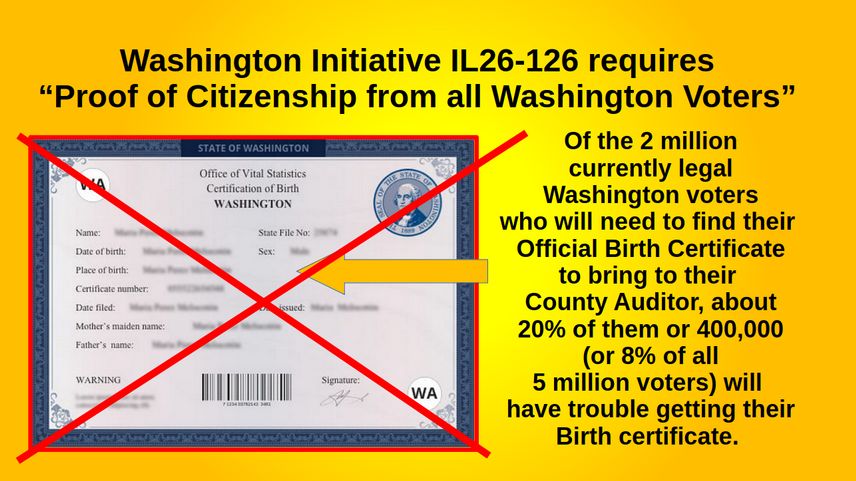
The groups most likely to be disenfranchised are homeless people and married women who have changed their surnames. Nearly 80 percent of married women adopt their partner’s surname, and some would be unable to register to vote if the name on their ID does not directly match their proof of citizenship. This point was raised by the League of Women Voters in a press release opposing the Trump 2025 Presidential Order that is similar to the Washington Voter ID Initiative. The problem is that women are a legally protected class. This means that the government is required to protect the rights of women.
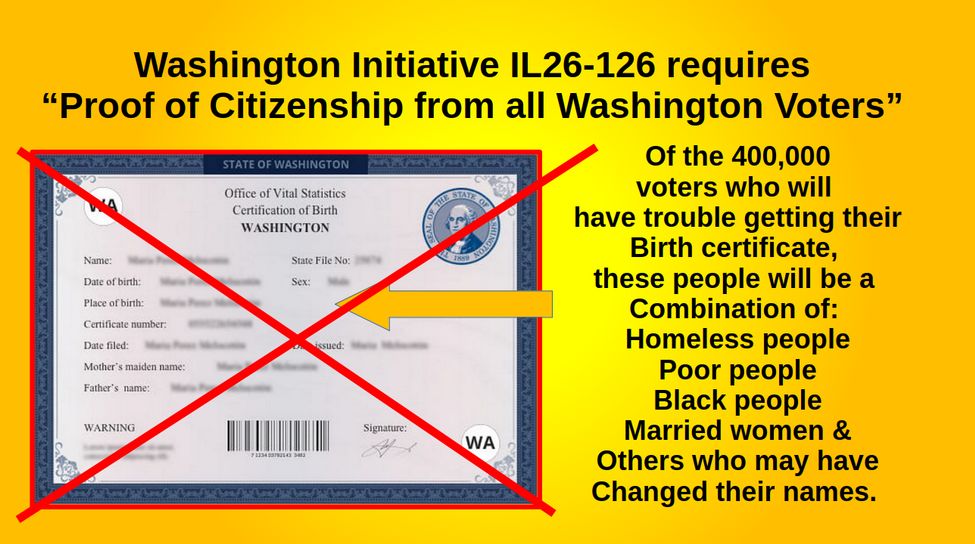
Problem #8: The Number of non-citizens registered to vote and actually voting in Washington state is very low
The actual number of non-citizens registered to vote and actually voting in Washington state is unknown. But studies done in 2017 and 2024 in Ohio found that about 800 out of 8 million voters were non-citizens and of these less than 200 actually voted.
In 2022 and 2024, Georgia conducted citizenship audits of its voter rolls. In 2024, Georgia found 20 noncitizens on the rolls by using jury declarations; nine of the 20 had voted at some point.
In 2017, Nevada conducted a statewide audit and identified 100 people statewide who presented evidence of non-citizenship while obtaining services from the DMV and completed a voter registration at the DMV. Information was given to the secretary of state's office to investigate. After investigating, that office found that 3 noncitizens had voted in 2016.
In 2019, Texas found nearly 100,000 possible foreigners on their voter rolls, of which about 58,000 may have voted in previous elections. Since 2021, Texas has removed over 6,500 potential foreign citizens from its voter rolls. Of those 6,500 foreign citizens, 1,930 actually voted. Given that Texas is about 4 times more populous than Washington, this would convert to about 500 actual illegal voters voting here in Washington.
In 2025, Iowa completed an audit of the 2024 general election and identified 277 noncitizens who were registered to vote. Of those, 35 noncitizens cast ballots that were counted.
In 2025, Michigan completed a review of motor vehicle records that identified 15 people who appear to be noncitizens that voted in the 2024 general election out of 5.7 million ballots cast.
All of the above studies can be found at this link:
https://www.ncsl.org/elections-and-campaigns/legislative-approaches-to-ensuring-only-citizens-vote
A 2024 Oregon study found 1,260 non-citizens had registered but only 10 had voted.
Combining all 8 of these studies, a reasonable conclusion is that there are very few non-citizens voting here in Washington.
But there is a more objective way of determining the number of illegal aliens registered to vote and voting here in Washington – a method that takes into account the huge wave of 4 million illegal aliens that were allowed to enter the US between 2021 and 2024. First, we determine the number of illegal aliens in our state. According to the US Census, nearly 23 million adult non-citizens were living in the US in 2023. This is an absolute minimum because the Census doesn’t count masses of non-citizens who falsely claim to be citizens or don’t fill out Census surveys. Also, the figure of 23 million doesn’t include the masses of non-citizens who’ve entered the US illegally since 2023. Since the rate of rise between 2021 to 2023 was about one million illegal aliens per year, a reasonable estimate for 2024 is 24 million. Of these, according to the US Census, about 600,000 people living in Washington state are foreign born and not US citizens.
Next, we need to estimate the percent of non-citizens registered to vote in our state. This unfortunately is going to be a very high figure since our Department of Licensing is registering voters automatically when they get a drivers license (this is a topic we will discuss in greater detail below).
At this point, I need to disclose that during the past few years, my wife and I have hosted several legal foreign exchange students at our home and some of them have obtained a US Drivers License. Those who obtained a Washington Drivers license all got registered to vote and received a letter from Steve Hobbs congratulating them on being registered to vote. I made sure that none of these students actually voted - and eventually, all of them were removed from the voter rolls. I do not know how they were removed. But we no longer receive ballots for any of them. Still this personal experience is one reason I know our voting system in Washington is messed up.
A detailed study published in 2024 estimated that 10% to 27% of illegal aliens are registered to vote in the US. While others have criticized this study and claimed that the actual number is 1% to 10% of illegal aliens registering to vote, I have reviewed the 2024 study and concluded it was accurately done. Given how bad things are here in Washington, with the Washington Department of Licensing automatically registering non-residents, I estimate that 20% of non-residents are being registered to vote here in Washington. This would put the number of non-resident registered voters in our state at 120,000.
The final number we need to estimate is the percent of these illegally registered voters who actually voted. The percent in other states ranged from 1% in Oregon to 25% in Ohio to nearly 30% in Texas. Given that actually voting illegally in a US election is a serious crime, but also given that Washington state uses all mail in ballots, making it easier for illegal aliens to vote once they are registered, I am going to use 10% to 20% as my “best guess.” Feel free to use your own guess because the truth is that things are so bad in our state that there is no way of knowing what the number really is This estimate would put the number of illegal voters who actually vote in Washington in 2024 at 12,000 to 24,000.
Divide this number by our 49 legislative districts and we have 250 to 500 illegal voters who actually voted per legislative district. This would not be enough to swing any state house races in 2024, but it could have swung the LD 18 Senate race which was decided by less than 200 votes.
Still, regardless of how many illegally cast votes there were in the 2024 Washington state election, we need to find a way to eliminate them without disenfranchising and discriminating against tens of thousands of poor people, homeless people, black people and married women. Given how important the right to vote is, we need a solution that does not disenfranchise even a single valid Washington state voter.
We will next look into the federal laws and federal rulings that are likely violated by the Washington Voter ID Initiative.
Problem #9 Similar Proof of Citizenship laws in many other states have been ruled to be legally invalid
Between 2009 and March 2025, at least nine states passed laws specifically addressing proof of citizenship. Most are not in force due to court decisions (see Summary of Case law below for details). These laws do not all take the same approach. Some are clear that people already on the rolls are assumed to be citizens; a few ask the voter to provide proof at the time of registration; and most direct state officials – not the citizens - to verify citizenship, which means checking other data sources.
Here is a link to a summary of all of these state voter ID laws:
https://www.ncsl.org/elections-and-campaigns/legislative-approaches-to-ensuring-only-citizens-vote
Laws requiring new registrants to show documentary proof of citizenship to register to vote:
Alabama (Ala. Code § 31-13-28)
Arizona (Ariz. Rev. Stat. § 16-166)
Kansas (Kan. Stat. Ann. §25-2309) (Not in force due to court decision)
Louisiana (La. Rev. Stat. § 18:104)
New Hampshire (N.H. Rev. Stat. § 654:7; § 654:12) (Note: proof of citizenship is only required for new voters. Voters who are already registered do not need to provide proof of citizenship.)
Laws requiring all registrants to show documentary proof of citizenship, but only if status cannot be verified using other data:
Georgia (Ga. Code Ann. § 21-2-216)
Indiana (Ind. Code § 3-7-33-4.7; § 3-7-38.2-7.3)
Tennessee (Tenn. Code Ann. § 2-2-141)
Laws requiring new registrants and those updating their voter registration to show documentary proof of citizenship:
Wyoming (Wyo. Stat. § 22-3-102 effective July 1, 2025)
In short, only one or two states have enacted laws demanding existing voters to provide proof of citizenship. These state laws are new and are likely to be voided in coming court challenges.
Arizona attempts to require proof of citizenship
Arizona began attempting to require proof of citizenship decades ago. In 2004, citizens approved a statewide ballot measure, Proposition 200, requiring evidence of citizenship for voter registration. Arizona's processes have been repeatedly challenged in courts over the past two decades. A description of Arizona's current process can be found here, and a list of what is accepted documentary proof of citizenship can be found here. In brief, a person who submits valid proof of citizenship when registering, or whose citizenship can be confirmed using data from the Department of Motor Vehicles, is registered to vote in all federal state and local elections. For new registrants who use the federal form to register and have not otherwise shown proof of citizenship, Arizona provides them with a ballot of "federal only" races. In other words, Arizona maintains a bifurcated voting system.
Arizona has one list of voters who can vote on all races, and a much smaller list of "federal only" voters who have registered on the federal form and have not yet shown documentation of citizenship. Being on the "federal only" list does not mean these voters are not US citizens; it means they have not yet shown documentary proof of their citizenship. Keeping two lists, and ensuring that a voter receives the right ballot, is a major challenge that requires having staffing to implement it. A different ballot is prepared for "federal only" voters in each of Arizona's nine congressional districts.
Summary of Federal Case rulings that state attempts to over-rule federal voting rights laws are illegal
Arizona v. Inter Tribal Council of Arizona, U.S. Supreme Court (2013)
In 2013, the U.S. Supreme Court held that an Arizona law requiring individuals to provide documentary proof of citizenship when registering to vote violated the National Voter Registration Act. The court held that the National Voter Registration Act of 1993 requires states to accept a federal voter registration form, which asks registrants to affirm their citizenship, but does not require documentary proof of citizenship. Also, the NVRA allows states to develop their own registration forms for state and federal elections, but the federal form by itself must always suffice to register a voter to vote in federal elections. Finally, states must accept the federal form without requiring registrants to submit any information beyond what the form (and any approved state-specific instructions) requires.
Fish v. Kobach, U.S. Court of Appeals for the Tenth Circuit (2016)
In this case, a federal court held that a Kansas law requiring individuals to submit documentary proof of citizenship when using a federal voter registration form violated the NVRA. The court held that the NVRA requires states to make a version of a federal voter registration form available during the driver’s license application process. The NVRA says that the form provided with a driver’s license application must require “only the minimum amount of information necessary to” enable the state to determine a voter’s eligibility. The NVRA already required registrants to attest to their citizenship under penalty of perjury on the federal form. This met the “minimum amount of information” requirement and the court ruled that Kansas’s law requiring additional documentary proof of citizenship went too far.
League of Women Voters v. Harrington, U.S. District Court for the District of Columbia (2021)
In this case, a federal district court struck down the U.S. Election Assistance Commission’s decision to include state-specific instructions requiring documentary proof of citizenship on federal voter registration forms for Alabama, Georgia and Kansas. When the lawsuit began in 2016, all three states had documentary proof of citizenship laws on the books, though the court noted that it was unclear whether Alabama and Georgia were actively enforcing their citizenship laws.
In its final opinion, the court held that the NVRA requires the U.S. Elections Assistance Commission to determine whether a state-specific instruction on the federal form is necessary to enable the state to assess voter eligibility. The EAC’s decisions violated the NVRA because the agency failed to determine whether the Alabama, Georgia and Kansas proof of citizenship instructions were necessary to confirm voter eligibility. The EAC’s decisions violated the Administrative Procedures Act because the agency did not follow the proper decision-making process.
New Hampshire Youth Movement v. Scanlan, Coalition for Open Democracy v. Scanlan, U.S. District Court for the District of New Hampshire (2024 – ongoing)
These lawsuits challenge a New Hampshire law requiring individuals to provide documentary proof of citizenship when registering to vote. As of March 2025, there is no court ruling on these cases yet. Both lawsuits argue that New Hampshire’s 2024 law places an undue burden on the right to vote in violation of the First and Fourteenth Amendments to the U.S. Constitution. Both lawsuits argue that this undue burden comes in part from the fact that New Hampshire removed the option to attest to citizenship under penalty of perjury, instead requiring all voters to provide documentary proof of citizenship. The Coalition for Open Democracy argues that the law violates the Fourteenth Amendment’s guarantee of procedural due process.
Mi Familia Vota v. Fontes, 9th Circuit U.S. Court of Appeals (2025)
In this case, several organizations and government entities filed challenges to multiple Arizona laws. In February 2025, a federal appeals court held that several of the challenged laws ran afoul of the NVRA, the federal Civil Rights Act and the U.S. Constitution. The Ninth Circuit 156 page opinion can be found here. https://www.justice.gov/crt/media/1390971/dl
The court made the following rulings on Arizona’s proof of citizenship laws:
Arizona’s law requiring individuals who register to vote with the federal form to provide documentary proof of citizenship in order to vote by mail or vote for president violated the NVRA and Arizona’s law requiring state voter registration forms to be rejected if the voter does not provide documentary proof of citizenship violated an agreement from a previous court case that directs Arizona to register such voters as federal-only voters.
League of Women Voters v Trump
On March 25, 2025, President Trump signed Executive Order 14248, also called Voter Roll Integrity and Citizenship Verification. Here is a quote from this Presidential Order:
“Sec. 2. Enforcing the Citizenship Requirement for Federal Elections.
To enforce the Federal prohibition on foreign nationals voting in elections:
(a)(i) Within 30 days of the date of this order, the Election Assistance Commission shall take appropriate action to require, in its national mail voter registration form issued under 52 U.S.C. 20508:
(A) documentary proof of United States citizenship, consistent with 52 U.S.C. 20508(b)(3); and
(B) a State or local official to record on the form the type of document that the applicant presented as documentary proof of US citizenship, including the date of the document's issuance, the date of the document's expiration (if any), the office that issued the document, and any unique identification number associated with the document as required by 52 U.S.C. 21083(a)(5)(A), while taking appropriate measures to ensure information security.
(ii) "documentary proof of United States citizenship" shall include a copy of:
(A) a United States passport;
(B) an identification document compliant with the requirements of the REAL ID Act of 2005 that indicates the applicant is a citizen of the United States;
(C) an official military identification card; or
(D) a valid Federal or State government-issued photo identification if such identification indicates that the applicant is a United States citizen.”
Several groups filed federal complaints. These complaints were all consolidated in 2025 League of Women Voters v Trump
On April 24, 2025, a federal judge issued a 120 page ruling which can be downloaded from this link:
The ruling stated that Congress made two laws that regulate what states can and can not do. The Trump Presidential Order violated these two laws. Only Congress has the power to change laws passed by Congress.
Here are quotes from this ruling:
“In 1993, Congress exercised its Elections Clause authority to regulate federal elections by enacting the National Voter Registration Act (“NVRA”). Congress’s stated purposes in enacting the NVRA included “establishing procedures that will increase the number of eligible citizens who register to vote in elections for Federal office,” helping officials at all levels of government implement the Act’s requirements “in a manner that enhances the participation of eligible citizens as voters in elections for federal office,” “protecting the integrity of the electoral process,” and ensuring the maintenance of “accurate and correct voter registration rolls.”
“The NVRA established a baseline set of voter registration procedures for federal elections that every State must implement, alongside “any other method of voter registration provided for under State law.”
For example, the NVRA requires that States allow people to apply for voter registration when applying for drivers’ licenses. The NVRA also requires each State to “accept and use” a standard federal “mail voter registration form” (the “Federal Form”)… the application must verify an applicant’s eligibility under state law through an “attestation that the applicant meets each such requirement[s]” that “requires the signature of the applicant, under penalty of perjury.”. The Form “may not include any requirement for notarization or other formal authentication.”
“Moreover, when enacting the NVRA, Congress considered and rejected a proposal that would have allowed States to impose exactly the kind of documentary-proof-of-citizenship requirement that the President’s Executive Order now directs the EAC to adopt, concluding that such a requirement was “not necessary or consistent with the purposes of [the] Act.” In short, the instruction in Section 2(a) “is incompatible with the expressed or implied will of Congress.”
State of Washington v Donald Trump
Separately, on April 4, Washington AG Nick Brown filed a 45 page complaint in the Ninth Circuit against the Trump Executive Order.
The Washington AG issued a Press Release that - while being a summary of their objections to the Trump Executive Order - can also provide a summary to how they will object to the Voter ID Initiative in 2026. Here are quotes from the Washington AG Press Release:
“This illegal executive order “harms States by purporting to override our sovereign laws governing the counting of votes and voter registration, imposing substantial costs on States to change state voting system and laws, and disenfranchising hundreds of thousands of State residents...The executive order also violates the National Voter Registration Act and the Help America Vote Act by unfairly making it harder to vote.”
“We oppose requirements that suppress eligible voters... The U.S. Constitution guarantees that all qualified voters have a constitutionally protected right… The order’s illegal and burdensome proof of citizenship requirements will disenfranchise voters. About 9 percent of U.S. citizens of voting age do not have such documents readily available, according to a 2023 report by the Brennan Center for Justice.”
Here is a link to the Washington AG 45 page complaint:
Here are quotes from the 45 page complaint:
“Congress enacted the NVRA based on its findings that “(1) the right of citizens of the United States to vote is a fundamental right; (2) it is the duty of the Federal, State and local governments to promote the exercise of that right; and (3) discriminatory and unfair registration laws and procedures can have a direct and damaging effect on voter participation in elections for Federal office and disproportionately harm voter participation by various groups, including racial minorities.” 52 U.S.C. § 20501(a)....allowing States to require documentary proof of citizenship was “not necessary or consistent with the purposes of this Act” and “could be interpreted by States to permit registration requirements that could effectively eliminate, or seriously interfere with, the Act’s mail registration program.”
“The Federal Form “may not include any requirement for notarization or other formal authentication.” Id. § 20508(b)(3)… Applicants must sign the attestation under penalty of perjury and are informed that a person providing false information “may be fined, imprisoned, or (if not a U.S. citizen) deported from or refused entry to the United States.”
“U.S. citizens who reside in Washington, as well as eligible service and overseas voters, can complete and submit the Washington State Form online, complete and return a paper copy, or be automatically registered to vote as part of a transaction in which a state agency confirms the person’s citizenship. E.g., Wash. Rev. Code §§ 29A.08.120, .123, .315.”
“Applicants must sign an oath declaring that “I am a citizen of the United States.” Wash. Rev. Code § 29A.08.230. Knowingly providing false information on a voter registration form is a class C felony punishable by up five years in prison and a fine of up to $10,000.”
“Before a person is registered to vote, Washington election officials must confirm the person’s identity. Wash. Rev. Code § 29A.08.107; see also 52 U.S.C. § 21083(a)(5)(A). This is done by comparing the applicant’s driver’s license number, state identification card number, or the last four digits of the applicant’s social security number to information maintained by the Washington Department of Licensing. Wash. Rev. Code § 29A.08.107.”
“Washington law requires that state and county election officials regularly review the statewide voter registration database to identify persons who are not eligible to vote… Washington residents may obtain a standard driver’s license or identicard (a state-issued identification card) without providing proof of citizenship. See Wash. Rev. Code § 46.20.035. This license “may not be used as evidence of or as a basis to infer an individual’s citizenship or immigration status for any purpose.” Wash. Rev. Code § 46.20.1921(1).”
Problem #10 The Washington Voter ID Initiative clearly violates NVRA
The National Voter Registration Act Of 1993 (NVRA) can be found here: https://www.justice.gov/crt/national-voter-registration-act-1993-nvra
The NVRA was enacted "to establish procedures that will increase the number of eligible citizens who register to vote in elections for Federal office" while "ensuring that accurate and current voter registration rolls are maintained." 52 U.S.C. § 2050l(b)(l), (4)… Section 8 of the NVRA addresses state voter list maintenance procedures for elections for federal office, prescribing specific conditions under which registrants may be removed from voter registration lists. Sections 8(a)(3) and 8(a)(4) prohibit states from removing a properly registered individual from the voter registration rolls for elections for Federal office except:
- At the request of the registrant,
• By reason of criminal conviction (as provided by State law),
• By reason of mental incapacity (as provided by State law),
• By reason of the death of the registrant, or
• By reason of a change in the residence of the registrant.
Even without all of the federal court rulings, it is obvious that no voter in Washington can be removed from the voter rolls because they do not have an enhanced Drivers License. They can only be removed when they ask to be removed, when they commit a crime, when they have a mental problem, when they move or when they die. There are no other exceptions.
Problem #11 The Washington Voter ID Initiative also violates HAVA
The Help America Vote Act HAVA) provides federal funds in return for complying with federal election laws. Here is a link to this 65 page federal voting rights law passed in 2002.
The purpose of HAVA is to improve our country’s election system. States are obligated to maintain accurate voter lists and thereby minimize the opportunities for and the incidence of fraud. Under Section 303(a) of HAVA, a voter registration application for an election for federal office may not be accepted or processed by the State unless it includes a driver’s license number from the applicant, or if the applicant does not have a driver’s license, the last four digits of the applicant’s social security number.
If an applicant has not been issued a current and valid driver’s license or social security number, the State must assign a special identifying number for voter registration. See 52 U.S.C. § 21083(a)(5)(A). Section 303(a)’s requirement that States utilize a unique identifying number to voters who indicate they have neither a driver’s license nor a social security number is an integral part of the minimum Federal standard.
The problem is that Washington state law allows the Washington State Department of Licensing to violate HAVA. When a person from another country comes into the Washington State Department of Licensing, they obviously do not have a Washington Drivers License. In addition, they likely do not have a US Social Security card. Despite these facts, they are allowed to check a box to be registered to vote and they are registered to vote and given a Washington Drivers License without any special identifying number. This is a clear violation of HAVA.
Thus, the real underlying problem is with the Washington State Department of Licensing. The Washington State Department of Licensing automatically gives Voter Registrations like cotton candy to anyone who applies for a Washington state drivers license. The second problem is with the State voter list required by HAVA. A person who did not have a Washington Drivers License or Social Security number should not have been put on that list without a special identifying number. The accurate state voter list is the responsibility of the Washington Secretary of State. Thus, Steve Hobbs is also is guilty of failing to comply with federal election laws.
It is his fault and the DMV fault that an unknown number of non-citizens have been illegally registered without a special ID number and thus are illegally able to vote in Washington. The solution to this problem is not to impose additional requirements on existing Washington voters. Rather it is for the federal government aka the Department of Justice to come out to Washington State and force Washington to comply with these two federal voting laws. Other states are also violating this HAVA requirement. Pam Bondi has already sent warning letters to North Carolina, Minnesota, Maryland, Pennsylvania, Wisconsin, Colorado, California and Arizona.
Here is a link to the Minnesota letter dated June 25, 2025: https://www.democracydocket.com/wp-content/uploads/2025/07/State-of-Minnesota.pdf
Here is a quote from the May 2025 DOJ HAVA complaint filed against North Carolina:
“Upon information and belief, a significant number of North Carolina voters who did not provide a driver’s license number or the last four digits of a social security number using that voter registration form were nonetheless registered by their election officials, in violation of HAVA Section 303(a).”
“Per Federal Law: Section 401 of HAVA assigns enforcement responsibilities to the Civil Rights Division of the DOJ. This section plays a critical role in ensuring that states adhere to federal laws and standards for election administration, including voter registration, voting systems, and provisional voting.”
NVRA requires that states maintain "clean and accurate" voter registration records. This includes the duty of each state to remove the names of voters who have died or changed their residency to another state. States are allowed to mail out Confirmation letters asking folks if they are dead or if they have moved. And all that it takes to stay on the voting rolls is to reply to the Confirmation letter that you are still alive and you have not moved. But many states, including Washington state, have failed to send out confirmation letters and failed to maintain accurate voter rolls and now the Department of Justice is going after them.
Why the Washington Voter ID Initiative violates HAVA
Regardless of whether the federal government is able to force states into cleaning up their voters rolls, as required by federal law, the Washington Voter ID Initiative also violates HAVA because HAVA does not require either finding your original birth certificate or getting a passport or getting an enhanced drivers license in order to register to vote.
Problem #12 The cost of gathering signatures for the Voter ID Initiative will likely exceed one million dollars
As this is an Initiative to the 2026 legislature, signed petitions do not need to be turned back in until December 2025. However, given that the past several Initiative drives by Let’s Go Washington have all required spending at least one million dollars each to paid signature gatherers, it can safely be assumed that this Initiative will likely require spending at least one million dollars just to get the 400,000 signatures to qualify the Initiative so it can be submitted to the 2026 legislature.
Note: While claims have been made that only 320,000 signatures need to be gathered, the truth is that 320,000 valid and unique signatures need to be gathered. With a 20% rate of duplicate or otherwise invalid signatures, it is really 400,000 signatures that need to be gathered. This million dollar cost for professional signature gatherers is over and above the countless hours of time that will be spent by volunteers gathering signatures to supplement the paid professional signature drive.
Because this is an Initiative to the legislature rather than an Initiative directly to the People, the Washington legislature will then be given the opportunity to draft their own less intrusive initiative. For example, they might draft an Initiative that grandfathers in all existing voters and only requires ID for new people.
Or they might match existing federal law and only require a special voter registration number for people who do not have a valid Drivers License or Social Security number. The voters will then be left to choose between an invasive Republican Party Voter ID Initiative that discriminates against Blacks, Poor People, Older People and Married Women versus a Democratic Party Initiative that protects all of these groups while still reducing the number of illegal aliens who can register to vote. After more millions are wasted on the 2026 election, even if the Voter ID initiative passes, there will still be a court challenge and the federal courts are almost certain to toss the Initiative out.
Problem #13 The Voter ID Initiative does not solve the Clark County Problem
A recent analysis of a close election in the 18th LD Senate race in Clark County found that the number of people who voted illegally exceeded the vote difference between the two candidates in the election. But the illegal voters were all US citizens who did not live in Clark County but voted in Clark County anyway. Nearly all of these were voters who had moved to a different county but had failed to update their addresses. The problem is that the county auditors are failing to keep their voter rolls current and accurate as required by federal law. The other problem is that the average voter moves every 3 to 5 years. So our voter rolls all across Washington right now are extremely inaccurate. Imposing Voter ID will not stop voters from moving every 3 to 5 years and it will do almost nothing to address the real problem of lazy auditors. What is really needed is a more accurate way of keeping track of voters who have moved.
Problem #14 There are at least 10 Less Intrusive State Alternatives to a Mass Citizenship Verification Initiative
There are major problems with Election Integrity in Washington state. However, these problems can be addressed without requiring a million legal voters to track down and submit their birth certificates.
Here are 10 other options that reduce registering non-citizens in a non-invasive way.
#1: In 2023, Ohio passed HB 458 requiring IDs and licenses issued to noncitizens must have a notation designating that they are a noncitizen.
#2: North Dakota driver's licenses and state-issued ID cards with "Temporary" or "Permanent" listed on them cannot be used for voting.
#3: Tennessee requires Drivers Licenses issued to noncitizens to include a visually distinctive marker indicating the License cannot be used for voting.
#4: Per SB 32, effective Jan. 1, 2026, Wyoming will require licenses issued to residents who are not U.S. citizens to state "Not a U.S. Citizen".
#5: In 2025, South Dakota passed SB 75 requiring an indication of citizenship status on driver licenses and ID cards.
#6: Effective Jan. 1, 2026, Montana will require licenses issued to U.S. citizens to have an eagle signifying their status as US citizens.
#7 Ohio SB 63 (2015) requires the secretary of state to conduct an annual review of the statewide voter registration database, including a comparison of information with the bureau of motor vehicles to identify a person who submits documentation to the bureau of motor vehicles indicating the person is not a U.S. citizen.
#8 Oklahoma SB 1040 (2023) specifies that voter registration services may not be offered to a person who provides documentation when applying for a driver's license or state ID card that shows the person is not a U.S. citizen.
#9 Rhode Island RI SB 770 (2017) established automatic voter registration and specified that the DMV is to not provide a voter registration application to anyone who has not certified they are a US citizen.
#10 In Washington state, on March 4, 2025, Jim Walsh introduced House Joint Memorial 4007 calling on the U.S. Department of Justice to audit and review the accuracy of Washington’s “implementation of the ‘Motor Voter Law. The Joint Memorial asked the Department of Justice to focus on “possible violations of the United States Constitution, the United States Code, the Washington Constitution or the Revised Code of Washington… RCW 29A.08.355, hereafter referred to as the "Motor Voter Law," involves the automatic registration of people to vote in elections in Washington with no determination of whether those people are, in fact, legal voters, which risks diluting legal Washington voters' voice in state law, policy, and government actions.”
Wyoming House Bill 156 litigation
As noted above, Wyoming requires drivers licenses issued to residents who are not U.S. citizens to state "Not a U.S. Citizen". On March 21, 2025, Wyoming passed House Bill 156 which clarified voter registration requirements in Wyoming. The law clarifies that:
"Proof of residence" means the documents or other proof of residence specified by rule of the secretary of state, which rule identifies documents or other proof that establishes residency. If a person does not have the documents or other proof of residency specified by rule of the secretary of state, "proof of residence" may be established by a signed attestation of the person that the person is a bona fide resident of the state of Wyoming. The attestation shall be subject to verification by the county clerk or the secretary of state;
"Proof of United States citizenship" means, for purposes of voter registration, any of the following:
(A) A valid Wyoming driver's license as defined by W.S. 31‑7‑102(a)(xxv) or a valid Wyoming identification card issued under W.S. 31‑8‑101, provided that the license or identification card does not contain any indication that the person is not a United States citizen;”
This law appears to comply with NVRA and HAVA. However, the law was immediately challenged in federal court. On July 22, 2025, the federal court issued a decision which can be read at this link:
https://wyofile.com/wp-content/uploads/2025/07/7_22_25-case-dismissed.pdf
Proponents of the Trump Executive Order and proponents of the Washington Voter ID Initiative have claimed that this federal court ruling was a victory for Documented Proof of Citizenship (DPOC). But it was not. The judge merely ruled that the group bringing the complaint lacked standing because they did not actually represent any voters in Wyoming. Thus, the court did not make any ruling on the merits of their argument.
But even if the group did have standing and even if the court did rule in favor of the new Wyoming law, it would not apply to either the Trump Executive order or the Washington Voter ID Initiative as both go much farther than the new Wyoming law – which still accepts an Oath.
Problem #15 There is at least one Federal Alternative to a Mass Citizenship Verification Initiative
2025 Congress SAVE Act: In 2024, the U.S. House of Representatives passed the Safeguard American Voter Eligibility (SAVE) Act, but it did not pass Congress and was reintroduced for this legislative session. On April 10, 2025 the bill passed the House, and it now awaits further judgment in the Senate. However, it does not appear that the bill will be even considered by the Senate as it has not even been assigned to a committee. The SAVE ACT is a Voter ID bill nearly identical to the Washington Voter ID Initiative. Therefore, if it ever did pass, the Washington Voter ID Initiative would become irrelevant. On the other hand, if the SAVE Act does not pas, then it is highly likely that federal courts, including the US Supreme Court, would rule that the Washington Voter ID Initiative violates NVRA and/or HAVA and/or the 14th Amendment to the US Constitution.
Problem #16 A better option is to address the real problem with an Initiative to amend other Washington Drivers License laws.
Rather than placing additional burdens on millions of actual Washington citizens to prove they are citizens, the burden should be placed where it belongs - on Washington state officials to stop automatically registering non-citizens to vote when they get a Drivers License.
Here is the real problem: “Washington residents may obtain a standard driver’s license or identicard (a state-issued identification card) without providing proof of citizenship. See Wash. Rev. Code § 46.20.035.”
This statement, taken from Nick Brown’s complaint against the Trump Executive Order, is true – but only because this law was amended in 2024 by House Bill 2099 to add two options that do not require providing proof of citizenship. See options (g) and (h) here: https://app.leg.wa.gov/RCW/default.aspx?cite=46.20.035
Option (g) provides ID cards to incarcerated persons with no check for citizenship per RCW 72.09.535
Option (h) provides ID cards to hospitalized patients with no check for citizenship per RCW 72.23.175
Closing these loopholes would return to the case that a normal Washington Drivers License would provide proof of citizenship.
In his complaint against Trump, Nick Brown also stated: “This license “may not be used as evidence of or as a basis to infer an individual’s citizenship or immigration status for any purpose.” Wash. Rev. Code § 46.20.1921(1).”
This RCW does not refer to a normal Washington Drivers License. Instead it refers to a REAL ID or Enhanced License! Shockingly, this statement by Nick Brown is true. This crazy law was passed in 2017 as Senate Bill 5008. It is essential to understand that under HAVA, either a normal Drivers License or Social Security card is accepted as Documented Proof of Citizenship and must be accepted as Proof of Citizenship. This badly written law (Wash. Rev. Code § 46.20.1921(1) means that if and when a Washington driver converts their license to an Enhanced License, they are giving up the very document that is their documented Proof of Citizenship – the opposite of what is intended by getting an Enhanced Drivers License.
While this problem is partially addressed by RCW 46.20.156, this law only creates more confusion. There should be no distinction between a normal Washington Drivers License and an Enhanced License for voter registration or proof of citizenship. Instead, there should be a special Non-citizen license for people who are not citizens.
Which brings us to another RCW that need to be amended. RCW 46.20.021 allows New Residents to get a Washington Drivers License without proof of citizenship. This must be amended so that there are two kinds of normal licenses and that if a person does not provide proof of citizenship (for example when getting food stamps) that they be issued a license or ID card that is labeled NO PROOF OF CITIZENSHIP PROVIDED. The same is true of RCW 46.20.036
The most important law that must be amended (by way of Initiative) is RCW 46.20.155. This law (the Automatic Voter Registration Law) violates federal law because it merely asks the applicant if they are a US citizen. Federal law requires a checkbox and an OATH of Affirmation under penalty of perjury, fine and imprisonment. This RCW is also contrary to RCW 46.20.035 which does Proof of Identity – but allows minors to proof their Identity by being accompanied by their parent who proves their citizenship by providing their drivers license.
Here are the Washington laws amended by the Voters ID Initiative to require that all Washington citizens must obtain a REAL ID card (also known as an Enhanced Drivers License) :
RCW 29A.08.010, 29A.08.123, 29A.08.210, and 29A.08.350
Here are the Washington laws that would need to be amended to directly require non-citizens to obtain a special Non-citizen Washington drivers license that could not be used to register to vote:
RWC 46.20.035, 46.20.1921(1), 46.20.156, 46.20.021, 46.20.036, and 46.20.155.
While the Voter ID Initiative violates federal law and requires millions of legal Washington voters to remain on the voter rolls, an Initiative to require a special Non-citizen Drivers license for people who are not citizens would comply with federal law and would not require any additional steps of existing legal Washington voters.
Problem #17 Huge differences between Washington State Proof of Identity laws and Washington Department of Licensing practices
If an Initiative to comply with federal law is considered, or if a request is filed to have the US Department of Justice issue a warning letter to Washington state for failure to comply with federal law, it is important to also address the fact that the Washington State Department of Licensing (DOL) is using Proof of Identity options that are not authorized even by the currently illegal and poorly written Washington state laws.
Here is a link to the Washington DOL 2 page brochure called “Identity Requirements.” https://dol.wa.gov/sites/default/files/2022-11/ID-requirements.pdf
This brochure is passed out to the public and contains numerous ways to prove identity that are not found in Washington laws. There are Stand Alone, A List and B List options and more options not on either list. These options go far beyond the options found in RCW 46.20.035
Do an online search for “Revised Code of Washington Identity requirements.” You will see there are no A or B lists in Washington voter registration laws. Nor are these “Stand Alone, A List and B list options to be found in federal laws.
Below is an image of the current Washington Identity Requirements brochure.
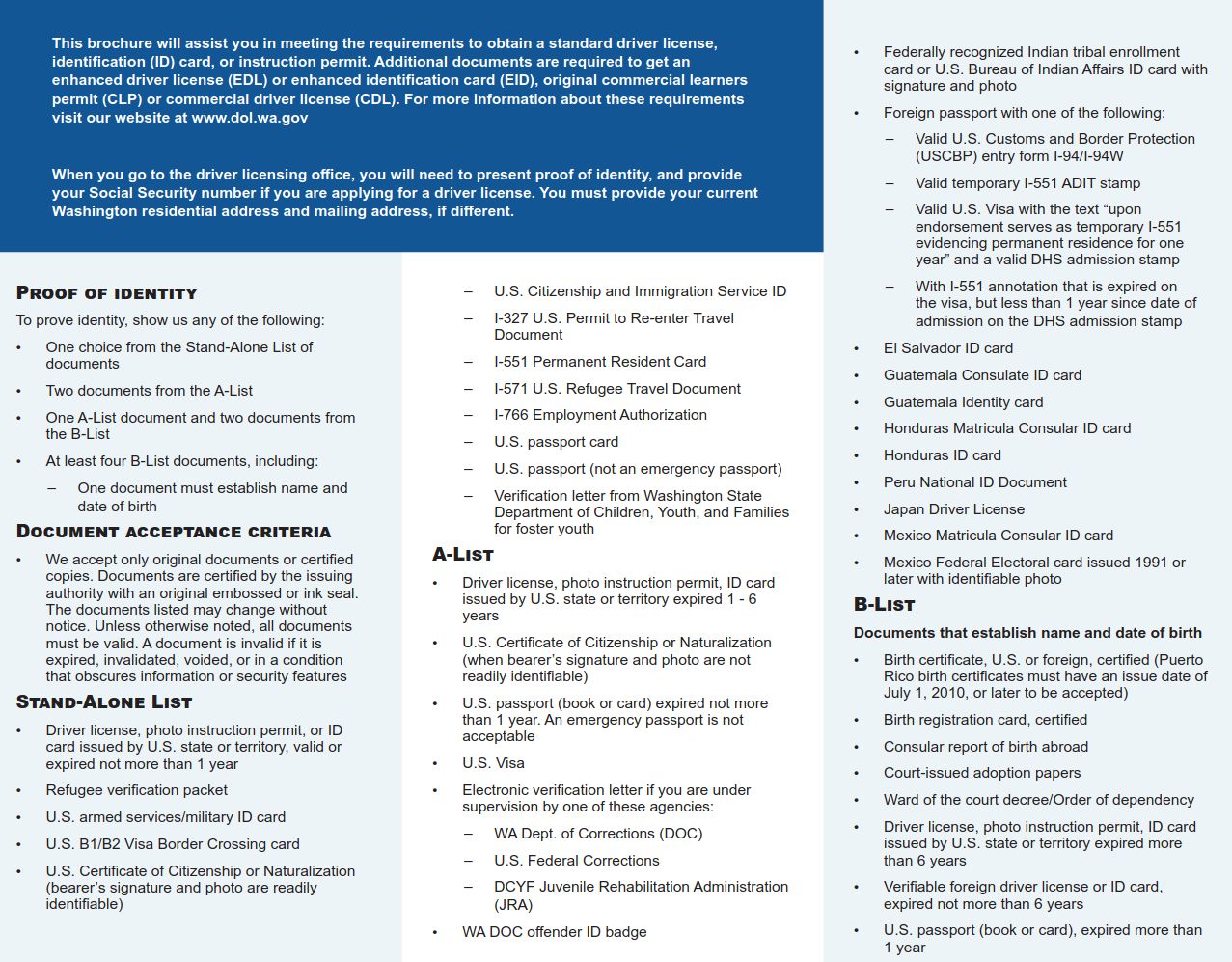
Thus, merely amending Washington laws is not enough. We also need to demand that actual DOL practices comply with state and federal laws.
Problem #18 Conservative Initiative Sponsors have a poor track record in drafting legal Initiatives
Proponents of the Voter ID Initiative have also mis-stated the success rate of past Initiatives. The truth is that over the past 25 years, there have been 11 Initiatives that were passed by the voters and then challenged in court. Of these 11 Initiatives passed by the voters and then challenged in court, 10 were ruled by the court to be unconstitutional.
This fact confirms that conservative Initiative sponsors have a poor track record of drafting legal Initiatives. I review the legal problems of all 10 of these rejected Initiatives in this article: https://washingtonfamilyrightscoalition.org/lessons-from-past-failed-initiatives/2-legal-failings-of-past-initiatives
Problem #19 Initiatives to the Legislature are only half as likely to become enduring laws as Initiatives submitted directly to the People
In addition, a review of all Initiatives filed during the past 12 years found that Initiatives submitted directly to the People were twice as likely to become enduring laws as Initiatives submitted to the Legislature. There have been 13 Initiatives to the People since 2012. 11 passed - but 3 of the 11 were later declared as violating our state constitution. Only 2 of the 13 Initiatives to the People failed to get a majority of votes in the General Election. So the success rate was 11 out of 13 equals 85%.
By contrast, there have been 16 Initiatives to the Legislature since 2012. 4 were approved by the legislature. But 1 of those 4 was later rejected by the voters and another (the Parents Rights Initiative) was approved by the Legislature only to be gutted the next year by the Legislature.
The remaining 12 Initiatives to the Legislature all failed to be approved by the legislature. Of these 12, only 5 were approved by the voters in the General Election. The remaining 7 were not approved by either the Legislature or the voters. So the success rate for Initiatives submitted to the Legislature was 2 plus 5 equals 7 out of 16 equals 44%.
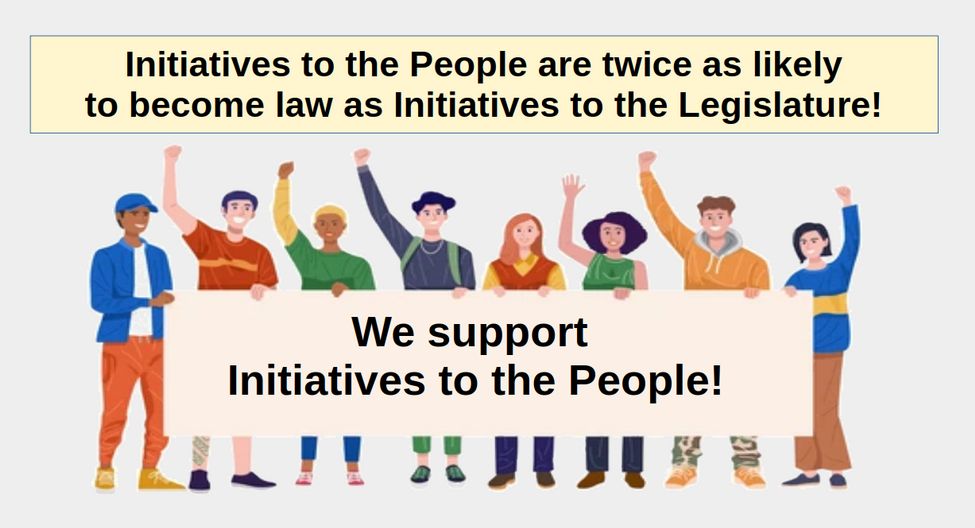
This fact calls into question the wisdom of submitting ANY Initiatives to the Legislature for ANY reason. Here is an article reviewing these 29 Initiatives. https://washingtonfamilyrightscoalition.org/lessons-from-past-failed-initiatives/4-why-we-should-submit-initiatives-directly-to-the-people
Problem #20 Proponents of the Voter ID Initiative has been misleading voters by making false claims about the Single Subject Rule
Proponents of the Voter ID Initiative have also repeatedly mis-stated the Washington State Constitution Single Subject Rule in order to mislead voters into thinking that their Voter ID Initiative is valid. For example, proponents of the Voter ID Initiative have incorrectly stated that “You can’t have an Initiative that changes multiple things in the law. Each Initiative must only do one thing.” See for example, this YouTube video:
https://www.youtube.com/watch?v=1QKt3Sz_aZM
In fact, just because an Initiative “only does one thing” does not make it valid. Also, you can have an Initiative that “does more than one thing” and be valid, as long as the topics are related to each other.
Article 2, Section 19, of the Washington State Constitution also called the Single Subject Rule, states: “No bill shall embrace more than one subject, and that shall be expressed in the title.”
The confusion in understanding the meaning of the Single Subject Rule has to do with the difference between a “subject” and a “topic.” Bills or Initiatives can only include one broad Subject, such as the subject “tax reform.” But as long as the subject is broadly stated, it can include many topics -provided that the topics are all related to the subject and are all rationally related to each other.
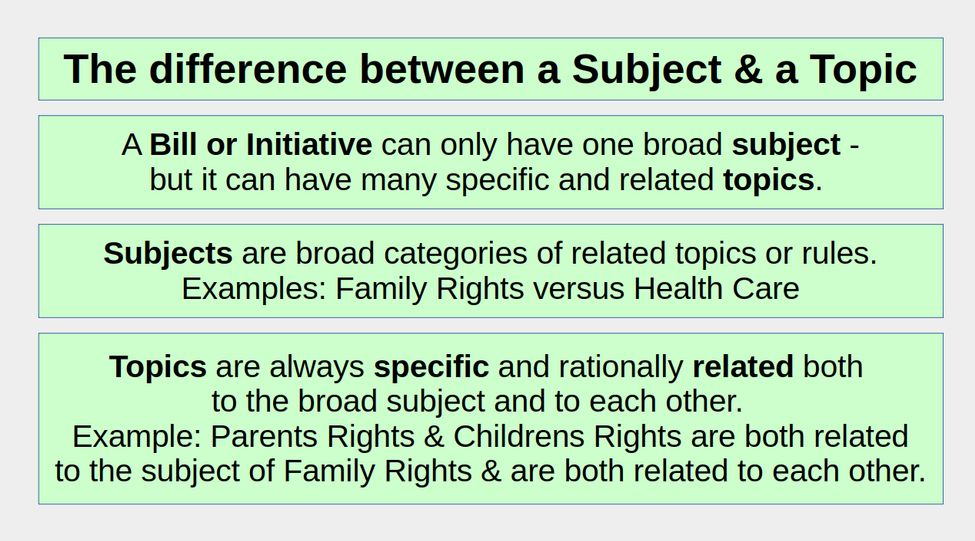
For example, in 2019, in the case called Garfield County v State, the Washington Supreme Court ruled that Initiative 976 ($30 car tabs) violated the Single Subject rule because the Initiative included two topics that were not related to each other.
Here is a link to this ruling:
https://www.courts.wa.gov/opinions/pdf/983208.PDF
Here is a quote from this ruling: “Section 12 is a specific directive to retire, defease, or refinance existing bonds, if possible. This is a separate subject from “limiting vehicle taxes and fees.” Accordingly, I-976 violates article II, section 19’s single subject rule.”
Here is another quote from this decision with the legal citations omitted:
“Our single subject analysis is framed differently depending on whether the ballot title is general or restrictive. The parties agree that I-976 has a general title. In such cases, all that is required is “‘rational unity between the general subject and the incidental subdivisions…. “
“The existence of rational unity is determined by whether the matters within the body of the initiative are germane to the general title and whether they are germane to one another.”
The 2024 Natural Gas Initiative also violated the Single Subject Rule
This distinction between subjects and topics is important because the 2024 Natural Gas Initiative was found to be unconstitutional because it contained subjects that were not related to each other. Here is a quote from the King County May 9 decision:
“The following subjects are among the many contained in the 20-plus pages of Initiative 2066: (1) providing natural gas to homes and businesses, (2) limiting the authority of agencies to control air pollution, and (3) changing building energy efficiency standards. Because these different subjects are not related to each other, I-2066 is unconstitutional under Section 19.”`
Proposal for a Better Process for Drafting & Reviewing Initiatives
Given that the Washington State Initiative submission process lacks the Public Hearing, Public Comment and Amendment processes – all required by bills submitted to the legislature, and given that Initiatives are submitted by a single person, and given the past track record of having over 90% of Initiatives approved by the voters - but then challenged in court - rejected by the court, resulting in the waste of millions of dollars and countless volunteer hours gathering signatures, we need a better process for drafting Initiatives before submitting them to the Secretary of State.
Just as the Republican Party “vets” candidates before endorsing them, the Republican Party should have a formal system for “vetting” initiatives before endorsing them. While any citizen retains the right to submit and promote any Initiative, if an Initiative is to have the support of the Washington State Republican Party, there needs to be an Initiative Review Committee which holds public hearings and accepts public comments and addresses several questions about the proposed Initiative including but not limited to:
#1: Does the proposed Initiative comply with the Single Subject Rule, the Full Text Rule and all other sections of the Washington State Constitution?
#2 Does the proposed Initiative comply with the US Constitution and current federal laws?
#3 Are there laws proposed or passed in other states to address similar problems?
#4 Are there other options that are less invasive and would be more likely to be approved by the voters?
#5 What have State or Federal courts ruled on similar laws?
How we can encourage the Washington State Republican Party to form an Initiative Review Committee
One option to encourage the Washington State Republican Party to form an Initiative Review Committee is to pass a resolution in favor of forming such a committee at a local LD or County Party meeting. Here is an example of such a Resolution in favor of an Initiative Review Committee:
Whereas the Republican Party routinely vets candidates before endorsing them; and
Whereas 10 out of the last 11 conservative Initiatives passed by the voters and later challenged in court were found to be invalid by the court due to Constitutional issues such as the Single Subject Rule; and
Whereas these legally invalid Initiatives included the 2018 $30 Car Tabs Initiative and the 2024 Natural Gas Initiative; and
Whereas the Washington Republican Party has invested countless volunteer hours gathering signatures for Initiatives that were later ruled to be unconstitutional; and
Whereas Republicans have invested millions of dollars passing Initiatives that were later found to be unconstitutional;
Therefore, we encourage the Washington State Republican Party to form an Initiative Review Committee to vet Initiatives for compliance with the Washington State Constitution, US Constitution and US federal laws before asking local LD and County Republican Party organizations to gather signatures and/or provide financial support for such Initiatives.
Name of Organization: __________________________
Date Resolution approved: _______________________
We will offer a free course on How to Write an Effective Initiative
The Voter ID Initiative is not alone in suffering from constitutional problems. Many of the Initiatives currently being contemplated in 2025 suffer from serious constitutional problems. We have therefore decided to offer a free four session course in How to Write an Effective Initiative.
Initiative Writing Course Topics include:
* Complying with Article 2, Section 19 The Single Subject Rule
* Complying with Article 2, Section 37 The Full Text Rule
* How to search state & federal court rulings
* Drawbacks of writing Initiatives to the Legislature
* Why amending existing comprehensive state laws rather than drafting new comprehensive laws is more likely to comply with the Single Subject Rule.
This free online course will be offered on Tuesday evenings from 6 to 8 pm.
To sign up for this free course on writing effective initiatives, visit this link:
https://washingtonfamilyrightscoalition.org/family-rights-courses/sign-up-for-our-effective-initiative-writing-course
Conclusion
It will take a million dollars or more just to place the Voter ID Initiative before the 2026 legislature. It is certain that the legislature will not pass this Initiative. Thus, it will go to the 2026 General Election. It is likely that the Legislature will draft their own Initiative “claiming” to offer the voters a less intrusive solution. Additional millions of dollars will then need to be spent by both sides. It is highly likely that the Democrats Alternative Initiative will win as they will likely outspend the Conservative option by at least five to one.
But even if the Conservative Voter ID option wins in the 2026 Election, it is certain to be challenged in federal court and it is nearly certain that the federal court will rule that it violates NVRA and/or HAVA and is therefore Null and Void.
Imagine if instead of spending millions on an Initiative doomed to failure, we invested a few thousand dollars training concerned citizens how to start their own Common Sense Community News websites and created a statewide network of these news websites to better inform Independent voters of how the Crazy Cult in Olympia is violating both federal laws and Common Sense on every issue that matters.
Imagine if we expanded the Parents Rights Initiative to be a comprehensive Family Rights Initiative that went beyond merely Parental Notice after our kids have been harmed - to actually protecting all of our children from harmful WOKE propaganda in the first place. We could convince hundreds of thousands of Independent voters - nearly all of whom are parents – to switch sides – and win the State House, Senate and Governors Races in 2028. That would be a wiser choice than trying to pass a Voter ID Initiative that is doomed to failure.
As always, I look forward to your questions and comments.
Regards,
David Spring M. Ed.
Director, Washington Family Rights Coalition
This email address is being protected from spambots. You need JavaScript enabled to view it.
